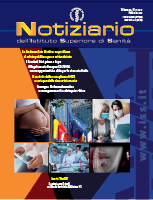Volume 35, no. 2, February 2022. Alcoholic Fetus Syndrome. The Ethics Committees before and after The European Regulation 536/2014. The surveillance model ItOSS as a support for research-intervention. Domestic abuse and consequences on psycho-physical health. RarISS Insert. Medicinal plants in the Rare Fund of the ISS Library.
Volume 35, no. 2, February 2022. Alcoholic Fetus Syndrome. The Ethics Committees before and after The European Regulation 536/2014. The surveillance model ItOSS as a support for research-intervention. Domestic abuse and consequences on psycho-physical health. RarISS Insert. Medicinal plants in the Rare Fund of the ISS Library.

Abstracts:
Alcoholic Fetus Syndrome: an underestimated public health problem
Ethanol is the most widely used drug worldwide. Its constantly growing consumption is reported even during pregnancy. Prenatal exposure to ethanol can lead to irreversible damages of the fetus. Fetal Alcohol Spectrum Disorders (FASD) and Fetal Alcohol Syndrome (FAS), which is the most severe aspect, are a range of malformative conditions leading to mental retardation that affect newborns and children who have been exposed to alcohol during pregnancy or breastfeeding. The approach to take towards this phenomenon is multidisciplinary and includes managing comorbid conditions, providing nutritional support, managing behavioural problems and educational difficulties, and providing parents with specific information. The World Health Organization and other scientific organizations recognize no safe amount of alcohol consumption during pregnancy and, therefore, recommend complete abstinence.
The Ethics Committees before and after The European Regulation 536/2014: new opportunities and challenges for the Italian research
With the European Regulation 536/2014 on clinical testing of medicines for human use, a new era of conducting clinical trials in Europe begins, as well as their review by Ethics Committees (EC). In Italy, in order to implement the Regulation, the Law no. 3 of 2018 establishes the limit of 40 territorial ethic committees (TECs) for the entire country and 3 national ECs, one of which dedicated to paediatric trials, and it provides for the establishment of a TECs National Coordination Centre at the Italian Medicines Agency with coordinating, guidance and monitoring functions. The Istituto Superiore di Sanità (ISS) - National Institute of Health, together with the Ministry of Health and the Italian Drug Agency (AIFA), is constantly engaged in the preparation of implementing decrees provided by Law 3/2018 and by Legislative Decree 52/2019. Moreover, to date, the TECs National Coordination Centre is chaired by the Director of the ISS Bioethics Unit and counts an ISS Director amongst its 15 members.
The surveillance model ItOSS as a support for research-intervention
The Italian Obstetric Surveillance System (ItOSS) implemented a capillary network of clinical representatives in the Italian maternity units, in collaboration with the Italian Regions. For over 10 years, ItOSS monitors maternal mortality and promotes research-intervention initiatives in order to improve maternity care and prevent avoidable maternal deaths. The manuscript describes the theoretical model of the surveillance and the initiatives that allowed to detect and monitor maternal deaths and to significantly reduce those related to obstetric haemorrhage.
Domestic abuse and consequences on psycho-physical health
The World Health Organization estimates that globally, even before the start of the SARS-CoV-2 pandemic, 1 in 3 women suffer some form of physical or sexual violence by a partner and/or stranger. The pandemic and social distancing and isolation measures have exposed women and children to further violence, mistreatment, abuse and even murder. Forms of psycho-physical stress have increased especially among women and children.
Topics
Dependencies Alcohol Lifestyles Global health and health inequalities National Guidelines System (SNLG) Prevention and health promotion Salute del bambino Salute riproduttiva Morbosità e mortalità materna Mortalità perinatale Pregnancy, childbirth and puerperiumPubblicazioni
Publications NotiziarioAnno
2022
